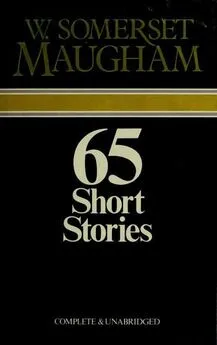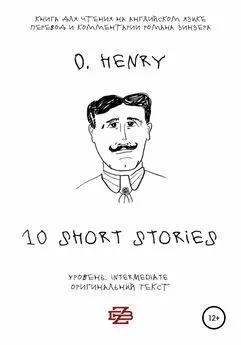Somerset Maugham - Sixty-Five Short Stories
- Название:Sixty-Five Short Stories
- Автор:
- Жанр:
- Издательство:неизвестно
- Год:неизвестен
- ISBN:нет данных
- Рейтинг:
- Избранное:Добавить в избранное
-
Отзывы:
-
Ваша оценка:
Somerset Maugham - Sixty-Five Short Stories краткое содержание
Sixty-Five Short Stories - читать онлайн бесплатно полную версию (весь текст целиком)
Интервал:
Закладка:
By this time we had persuaded the waiter to bring us some cabbage soup, and my acquaintance pulled a small bottle of vodka from his pocket which he invited me to share. I do not know whether it was the vodka or the natural loquaciousness of his race that made him communicative, but presently he told me, unasked, a good deal about himself. He was of noble birth, it appeared, a lawyer by profession, and a radical. Some trouble with the authorities had made it necessary for him to be much abroad, but now he was on his way home. Business had detained him at Vladivostok, but he expected to start for Moscow in a week and if I went there he would be charmed to see me.
'Are you married?' he asked me.
I did not see what business it was of his, but I told him that I was. He sighed a little.
'I am a widower,' he said. 'My wife was a Swiss, a native of Geneva. She was a very cultivated woman. She spoke English, German, and Italian perfectly. French, of course, was her native tongue. Her Russian was much above the average for a foreigner. She had scarcely the trace of an accent.'
He called a waiter who was passing with a tray full of dishes and asked him, I suppose-for then I knew hardly any Russian-how much longer we were going to wait for the next course. The waiter, with a rapid but presumably reassuring exclamation, hurried on, and my friend sighed.
'Since the revolution the waiting in restaurants has become abominable.'
He lighted his twentieth cigarette and I, looking at my watch, wondered whether I should get a square meal before it was time for me to start.
'My wife was a very remarkable woman,' he continued. 'She taught languages at one of the best schools for the daughters of noblemen in Petrograd. For a good many years we lived together on perfectly friendly terms. She was, however, of a jealous temperament and unfortunately she loved me to distraction.'
It was difficult for me to keep a straight face. He was one of the ugliest men I had ever seen. There is sometimes a certain charm in the rubicund and jovial fat man, but this saturnine obesity was repulsive.
'I do not pretend that I was faithful to her. She was not young when I married her and we had been married for ten years. She was small and thin, and she had a bad complexion. She had a bitter tongue. She was a woman who suffered from a fury of possession, and she could not bear me to be attracted to anyone but her. She was jealous not only of the women I knew, but of my friends, my cat, and my books. On one occasion in my absence she gave away a coat of mine merely because I liked none of my coats so well. But I am of an equable temperament. I will not deny that she bored me, but I accepted her acrimonious disposition as an act of God and no more thought of rebelling against it than I would against bad weather or a cold in the head. I denied her accusations as long as it was possible to deny them, and when it was impossible I shrugged my shoulders and smoked a cigarette.
'The constant scenes she made me did not very much affect me. I led my own life. Sometimes, indeed, I wondered whether it was passionate love she felt for me or passionate hate. It seemed to me that love and hate were very near allied.
'So we might have continued to the end of the chapter if one night a very curious thing had not happened. I was awakened by a piercing scream from my wife. Startled, I asked her what was the matter. She told me that she had had a fearful nightmare; she had dreamt that I was trying to kill her. We lived at the top of a large house and the well round which the stairs climbed was broad. She had dreamt that just as we had arrived at our own floor I had caught hold of her and attempted to throw her over the balusters. It was six storeys to the stone floor at the bottom and it meant certain death.
'She was much shaken. I did my best to soothe her. But next morning, and for two or three days after, she referred to the subject again and, notwithstanding my laughter, I saw that it dwelt in her mind. I could not help thinking of it either, for this dream showed me something that I had never suspected. She thought I hated her, she thought I would gladly be rid of her; she knew of course that she was insufferable, and at some time or other the idea had evidently occurred to her that I was capable of murdering her. The thoughts of men are incalculable and ideas enter our minds that we should be ashamed to confess. Sometimes I had wished that she might run away with a lover, sometimes that a painless and sudden death might give me my freedom; but never, never had the idea come to me that I might deliberately rid myself of an intolerable burden.
'The dream made an extraordinary impression upon both of us. It frightened my wife, and she became for a little less bitter and more tolerant. But when I walked up the stairs to our apartment it was impossible for me not to look over the balusters and reflect how easy it would be to do what she had dreamt. The balusters were dangerously low. A quick gesture and the thing was done. It was hard to put the thought out of my mind. Then some months later my wife awakened me one night. I was very tired and I was exasperated. She was white and trembling. She had had the dream again. She burst into tears and asked me if I hated her. I swore by all the saints of the Russian calendar that I loved her. At last she went to sleep again. It was more than I could do. I lay awake. I seemed to see her falling down the well of the stairs, and I heard her shriek and the thud as she struck the stone floor. I could not help shivering.'
The Russian stopped and beads of sweat stood on his forehead. He had told the story well and fluently so that I had listened with attention. There was still some vodka in the bottle; he poured it out and swallowed it at a gulp.
'And how did your wife eventually die?' I asked after a pause.
He took out a dirty handkerchief and wiped his forehead.
'By an extraordinary coincidence she was found late one night at the bottom of the stairs with her neck broken.'
'Who found her?'
'She was found by one of the lodgers who came in shortly after the catastrophe.'
'And where were you?'
I cannot describe the look he gave me of malicious cunning. His little black eyes sparkled.
'I was spending the evening with a friend of mine. I did not come in till an hour later.'
At that moment the waiter brought us the dish of meat that we had ordered, and the Russian fell upon it with good appetite. He shovelled the food into his mouth in enormous mouthfuls.
I was taken aback. Had he really been telling me in this hardly veiled manner that he had murdered his wife? That obese and sluggish man did not look like a murderer; I could not believe that he would have had the courage. Or was he making a sardonic joke at my expense?
In a few minutes it was time for me to go and catch my train. I left him and I have not seen him since. But I have never been able to make up my mind whether he was serious or jesting.
Miss King
It was not till the beginning of September that Ashenden, a writer by profession, who had been abroad at the outbreak of the war, managed to get back to England. He chanced soon after his arrival to go to a party and was there introduced to a middle-aged colonel whose name he did not catch. He had some talk with him. As he was about to leave, this officer came up to him and asked:
'I say, I wonder if you'd mind coming to see me. I'd rather like to have a chat with you.'
'Certainly,' said Ashenden. 'Whenever you like.'
'What about tomorrow at eleven?'
'All right.'
'I'll just write down my address. Have you a card on you?'
Ashenden gave him one and on this the colonel scribbled in pencil the name of a street and the number of a house. When Ashenden walked along next morning to keep his appointment he found himself in a street of rather vulgar red-brick houses in a part of London that had once been fashionable, but was now fallen in the esteem of the house-hunter who wanted a good address. On the house at which Ashenden had been asked to call there was a board up to announce that it was for sale, the shutters were closed, and there was no sign that anyone lived in it. He rang the bell and the door was opened by a non-commissioned officer so promptly that he was startled. He was not asked his business, but led immediately into a long room at the back, once evidently a dining-room, the florid decoration of which looked oddly out of keeping with the office furniture, shabby and sparse, that was in it. It gave Ashenden the impression of a room in which the brokers had taken possession. The colonel, who was known in the Intelligence Department, as Ashenden later discovered, by the letter R. rose when he came in and shook hands with him. He was a man somewhat above the middle height, lean, with a yellow, deeply lined face, thin grey hair, and a toothbrush moustache. The thing immediately noticeable about him was the closeness with which his blue eyes were set. He only just escaped a squint. They were hard and cruel eyes, and very wary; and they gave him a cunning, shifty look. Here was a man that you could neither like nor trust at first sight. His manner was pleasant and cordial.
He asked Ashenden a good many questions and then, without further to-do, suggested that he had particular qualifications for the secret service. Ashenden was acquainted with several European languages and his profession was excellent cover; on the pretext that he was writing a book he could without attracting attention visit any neutral country. It was while they were discussing this point that R. said:
'You know, you ought to get material that would be very useful to you in your work.'
'I shouldn't mind that,' said Ashenden.
'I'll tell you an incident that occurred only the other day and I can vouch for its truth. I thought at the time it would make a damned good story. One of the French ministers went down to Nice to recover from a cold and he had some very important documents with him that he kept in a dispatch-case. They were very important indeed. Well, a day or two after he arrived he picked up a yellow-haired lady at some restaurant or other where there was dancing, and he got friendly with her. To cut a long story short, he took her back to his hotel-of course it was a very imprudent thing to do-and when he came to himself in the morning the lady and the dispatch-case had disappeared. They had one or two drinks up in his room and his theory is that when his back was turned the woman slipped a drug into his glass.'
R. finished and looked at Ashenden with a gleam in his close-set eyes.
'Dramatic, isn't it?' he asked.
'Do you mean to say that happened the other day?'
'The week before last.'
'Impossible,' cried Ashenden. 'Why, we've been putting that incident on the stage for sixty years, we've written it in a thousand novels. Do you mean to say that life has only just caught up with us?'
R. was a trifle disconcerted.
'Well, if necessary, I could give you names and dates, and believe me, the Allies have been put to no end of trouble by the loss of the documents that the dispatch-case contained.'
'Well, sir, if you can't do better than that in the secret service,' sighed Ashenden, 'I'm afraid that as a source of inspiration to the writer of fiction it's a wash-out. We really can't write that story much longer.'
It did not take them long to settle things and when Ashenden rose to go he had already made careful note of his instructions. He was to start for Geneva next day. The last words that R. said to him, with a casualness that made them impressive, were:
'There's just one thing I think you ought to know before you take on this job. And don't forget it. If you do well you'll get no thanks and if you get into trouble you'll get no help. Does that suit you?'
Читать дальшеИнтервал:
Закладка:










